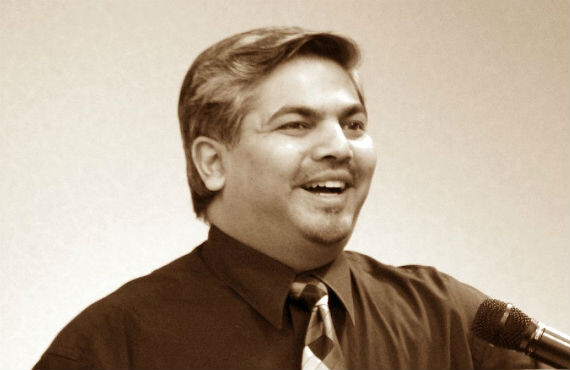‘Couldn’t Be Chased From Studying Russia,’ Penn Professor Labors On
A research trip to Russia 12 years ago has left University of Pennsylvania political science professor Rudra Sil with an appreciation of why some people fear that extreme far-right groups will gain more influence in the new Ukraine.
On June 9, 2002, Sil was attacked on the streets of Moscow.
A crowd of thousands had gathered to watch a World Cup match between Russia and Japan being broadcast on a massive outdoor screen in Manezh Square near the Kremlin. Russia’s 1-0 loss to Japan sent Russian soccer fans on a rampage of violence and destruction. The rioters set cars on fire, smashed store windows and started going after East Asians, then expanded to all Asians, and then eventually to all non-whites.
Sil, born in Calcutta, now Kolkata, is of Indian descent, and his brown skin made him a target. As he emerged from a metro station and became caught up in the riot, he suffered blows to the head and body in a vicious beating. Blood seeped from a head gash. Sil had to seek cover in a police station cell at the metro station to avoid the possibility of more assaults.
Because he spoke Russian, he was escorted to the regional district office to give his account in great detail, having to repeat himself as the authorities prepared different versions. In the end, six hours elapsed before he was seen at a medical clinic.
The attack left him with a permanent scar above his right eye.
Sil, however, harbors no ill will against those whom he calls “ordinary” Russians. He points out that that his attackers in Moscow weren’t “‘ordinary’ but right-wing skinheads that [Russian President Vladimir] Putin has been trying to reign in.”
Since the attack, Sil has travelled to Russia many times for his research, most recently on the eve of the 2011 parliamentary elections.
“It was definitely a scary experience back then, and I am glad that it only left a physical scar and not an emotional scar that would chase me away from studying Russia,” he says.
Now, almost 12 years after that scary incident, Sil finds himself just as troubled with American coverage of Russian politics and society as he was back then. While he views the current crisis in the Ukraine as a terrible mess that all major powers have had a hand in creating, he is also frustrated by the simplified images and narratives being circulated about Russia and its leaders.
“The American public needs to be informed about events that led up to the current crisis beyond inflammatory stories of how a big, bad ex-KGB spy is resurrecting the Soviet Union and instigating a new cold -- or hot-- war in Europe.”
As Sil closely follows the crisis in Ukraine and Russia's responses to U.S. sanctions following the annexation of Crimea, he is continuing to work on a book tracing the evolution of labor relations in Russia, with comparisons to Poland, the Czech Republic, China and Vietnam. That book is tentatively titled Pathways of the Postcommunist Proletariat.
In addition, Sil, who is also the School of Arts and Sciences’ faculty director of the Huntsman Program in International Studies and Business, is working on an article, "Last BRIC Standing," appraising Russia's long-term developmental prospects in relation to the other “BRIC” countries -- Brazil, India, China.
He is the author or editor of six books, including World Order After Leninism and Managing “Modernity”: Work, Community and Authority in Late-Industrializing Japan and Russia and Beyond Paradigms: Analytic Eclecticism in the Study of World Politics, with Peter Katzenstein. Sil also has written articles on various aspects of post-communist politics and political economy.








